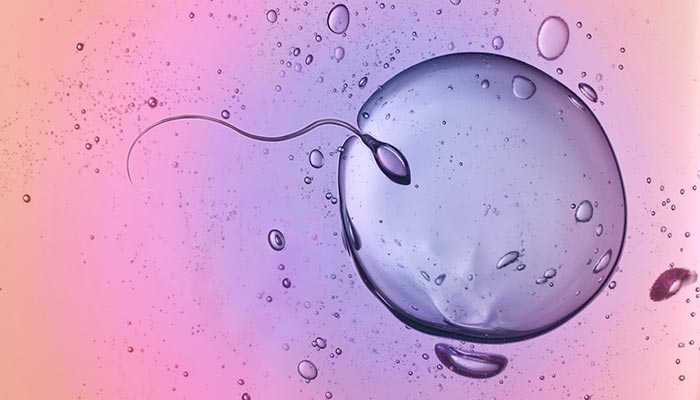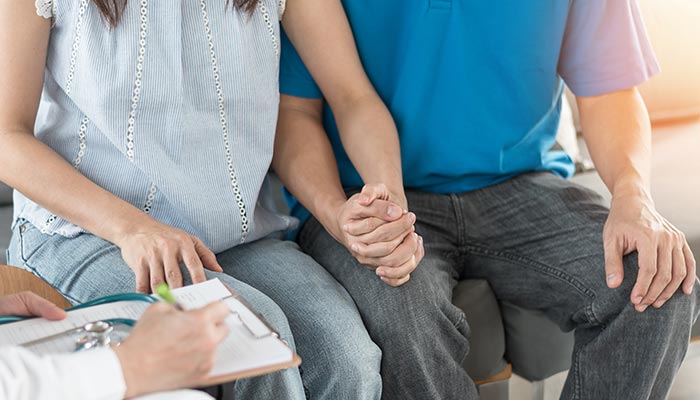
Tailored diagnosis, expert procedures
For couples finding it hard to conceive, I offer a full range of fertility treatments.
Here, it is important to note that the fertility of both the woman and her partner plays a crucial role in being able to grow their family.
In a third of such cases, the fertility challenge will lies with the woman, in a third of cases with her partner, and in the remaining cases either both partners’ low fertility obstructs conception, or else, no specific cause for infertility can be identified.
Common factors contributing to infertility in women, include:
- Ovulation disorders due to conditions such as Polycystic ovarian syndrome, hyper/hypothyroidism, over exercise, eating disorders, etc.
- Uterine or cervical abnormalities
- Fallopian tube damage or blockage that can stop implantation of a fertilised egg in the uterus
- Endometriosis, where endometrial tissue grows outside of the uterus, affecting the function of the ovaries, uterus and fallopian tubes
- Early menopause, where ovaries shut down and menses stops before age 40
- Pelvic adhesions
- Endometriosis or pelvic surgery
- Damage related to cancer and its treatment. Both radiation and chemotherapy can affect fertility
Common factors contributing to infertility in men, include:
- Abnormal sperm production or function due to factors such as diabetes or testicular infections. Enlarged veins in the testes (varicocele) can also affect the quality of sperm
- Problems with delivery of sperm – causes can include premature ejaculation, cystic fibrosis, intra-testicular blockages or damage or injury to the reproductive organs
- Overexposure to toxins and chemicals – e.g. pesticides, cigarettes, alcohol, marijuana, anti-bacterial medications
- Frequent exposure of reproductive area to heat which may also lower sperm production
- Damage related to cancer and its treatment. Both radiation and chemotherapy can affect fertility
Fertility Treatments – What to Expect
To begin with, I will typically require that you and your partner undergo standard tests to establish your respective levels of fertility.
After we have the results, we can discuss treatment strategies, which can include, but are not limited to:
- Taking medications to stimulate egg (ovulation induction) or sperm production
- Harvesting and combining of eggs and sperm, then placing the resultant embryos into the uterus
- Surgery to eliminate factors damaging the reproductive organs, e.g. endometriosis
- Therapy to treat an underlying medical condition e.g. diabetes, hyperthyroidism
- Lifestyle changes e.g. quitting smoking, minimising or eliminating alcohol intake, taking regular exercise and lowering stress
- Weight loss and nutritional supplements
Such treatments will go hand in hand with you and your partner having regular intercourse, at identified times of ovulation, to ensure the highest chances of conceiving.

Assisted Reproductive Technologies (ART)
Between 85%-90% of couples dealing with infertility will be able to conceive naturally by opting for medication and/or surgery. Fewer than 5% will need to be further treated by Assisted Reproductive Technologies, of which the most commonly used is In Vitro Fertilisation (IVF).
IVF entails taking fertility drugs to stimulate your ovaries to produce eggs. If all goes well, those eggs are retrieved in an out-patient procedure and combined with your partner’s or donor sperm, in a special cocktail of nutrients, then left alone until fertilisation takes place.
After fertilisation, one to two embryos are placed inside your uterus, with the hope being for you be able to proceed to a full-term pregnancy.
Intrauterine insemination entails direct injection of spermatozoa into the inner cavity of your uterus, in order to increase the number of sperm entering your fallopian tubes, and improve the chances of egg fertilisation. Here, the semen specimen (either raw or thawed from a frozen cohort) will be processed to separate the motile spermatozoa from the rest of the ejaculate.
IUI can be implemented during a natural cycle or following controlled ovarian stimulation, similar to the timed-intercourse approach.
Constituting one third of all types of ART, egg donation is recommended in cases of premature ovarian failure, early menopause, or where available eggs are poor in quality, limited in number or genetically abnormal.
This treatment is advised only after undergoing a thorough fertility assessment, receiving pre-treatment counselling, and possibly after one or more IVF treatments have failed to lead to conception.
Egg donors are recruited according to very strict criteria: being 30 years or younger and with proven fertility potential. They also receive psychological evaluation to ensure they understand the implications of donation and possess the cognitive, emotional and behavioural profile to undergo the process. In Cyprus, egg donation is presently anonymous.
If you respond poorly to controlled ovarian stimulation regimens for IVF, or simply do not wish to be administered hormones for personal or medical reasons, then Natural Cycle IVF treatment may be suggested - a modality where no stimulation drugs are used.
Here, egg collection will be aligned to your natural menstrual cycle, aiming to collect the one egg naturally selected and matured by your body. This will require daily ultrasound scans and oestrogen tests, as of five to six days prior to the expected day of ovulation, in order to monitor the follicle’s development. Once the follicle reaches a mean size of 18mm, a triggering injection will be administered and egg collection will be programmed for 34-36 hours thereafter.
The quality of the mature egg with this treatment tends to be superior to those retrieved from stimulated cycles. However, there is, nevertheless, the possibility that the single follicle will ovulate before collection or might still be immature at retrieval. This treatment is unsuitable for pre-menopausal women with anovulatory infertility.
Pre-implantation Genetic Diagnosis identifies genetic defects in embryos usually created in the IVF process before they are implanted. It is a procedure offered to you, if you and/or your partner are at risk of transmitting an inherited disorder to your offspring, either due to a single gene defect (monogenic disorder) or due to a structural abnormality in your chromosomes.
This treatment may also be suggested if you are aged 35 and over, or you have experienced recurring pregnancy loss or have had more than one failed fertility treatment.
PGD begins with normal IVF, which includes egg retrieval and fertilisation in the laboratory. After embryos undergo multicellular division, a few cells are micro-surgically removed, following which the embryos are frozen. The DNA from the removed cells is then evaluated to detect the inheritance of problematic genes. Once PGD has determined genetically sound embryos, one to two are placed in your uterus for implantation. Additional problem-free embryos are frozen for possible later use; embryos with problematic genes are destroyed.
Cryopreservation is a fertility treatment used to freeze, and later thaw embryos, eggs or sperm for use in IVF cycles. Thawed sperm may also be used in IUI treatment cycles. With availability of frozen embryos, no ovulation induction via fertility drugs is required for embryo transfer.
Embryo Cryopreservation is the process of freezing and storing the extra embryos derived from IVF cycles, for a variety of reasons. You and your partner may object to the destruction of the additional embryos or may want another chance to get pregnant if IVF fails the first time, while significantly reducing the inconvenience, financial and psychological burdens of the process. If you do get pregnant, you may wish to use the frozen embryos later to have another baby. You may also wish to save embryos before beginning treatments, such as for cancer, which might reduce or eliminate your ability to get pregnant.
Oocyte Cryopreservation entails harvesting eggs from your ovaries, following ovulation induction to produce multiple eggs for retrieval, and then freezing them unfertilised for later use. Oocyte cryopreservation is considered where you have a fertility-threatening condition, e.g. sickle cell anaemia, or autoimmune diseases like lupus. It is also considered where you will undergo treatment for conditions such as cancer that can negatively impact your pregnancy chances, and so allow you the chance of having biological children later. This option is also appropriate if you are undergoing IVF and prefer to save eggs rather than embryos for religious or ethical reasons, or wish to preserve younger eggs for a later time when you feel readier to get pregnant.
Semen Cryopreservation entails freezing sperm and storing it for future use. Samples of semen are collected and checked under a microscope in the laboratory to count sperm cells and determine how healthy they are. The sperm cells (spermatozoa) are then frozen and stored. Sperm cryopreservation is often used for men who want to become fathers before having treatment that may cause infertility, such as certain cancer treatments.
Men with no sperm in their ejaculate (azoospermia), but with functioning spermatogenesis can still father children via surgical retrieval of spermatozoa from their epididymis or testis, and Intracytoplasmic Sperm Injections (ICSI). The azoospermia may be due to a congenital obstruction of the sperm ducts, vasectomy, failed vasectomy reversal, or testicular failure.
PESA, or Percutaneous Epididymal Sperm Aspiration is performed under local anaesthetic and does not require a surgical incision. A small needle is passed directly into the head of the epididymis through the scrotal skin and fluid is aspirated. The embryologist retrieves the sperm cells from the fluid and prepares them for ICSI.
TESE, or Testicular Sperm Extraction is performed under general anaesthetic and entails the extraction of tissue from the testis for later processing in the lab to retrieve sperm cells for ICSI.
MESA, or Microsurgical Epididymal Sperm Aspiration is performed, under general anaesthetic, on men with obstructive azoospermia and entails dissection of the epididymis under the operating microscope and incision of a single tubule. Fluid then spills from the epididymal tubule and pools in the epididymal bed, after which it is aspirated.
MICRO-TESE, or Microsurgical Testicular Sperm Extraction is performed under general anaesthetic only on men with non-obstructive azoospermia. Here the operating microscope explores different parts of the testes following a superficial incision, to determine the most productive areas of the tissue.
This is an IVF procedure in which a single, morphologically normal motile sperm cell (spermatozoon) is selected and injected directly into the cytoplasm of an egg (oocyte), in order to achieve fertilisation mechanically.
ICSI is applied in cases of impaired sperm motility, count and morphology in normally ejaculated spermatozoa, and during microsurgical sperm aspiration or testicular sperm extraction.
ICSI is also used in cases of repeated fertilisation failures using conventional egg insemination, and for couples where a fertility problem could not be determined (idiopathic infertility).
Fertilisation rates after ICSI vary between 70-90%, depending on the skills of the embryologist performing the procedure and the quality of the gametes (spermatozoa and oocytes).